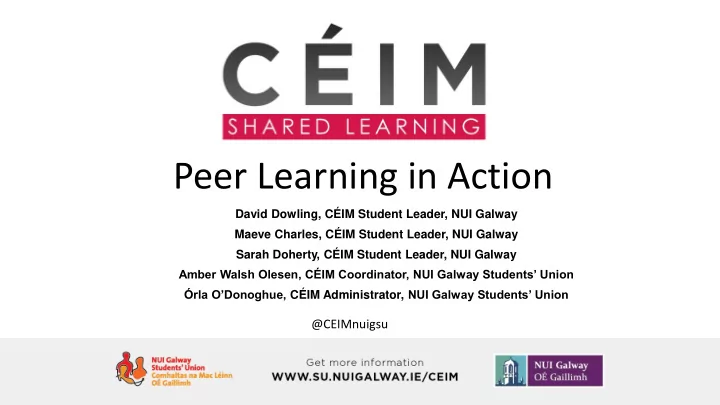

Peer Learning in Action David Dowling, CÉIM Student Leader, NUI Galway Maeve Charles, CÉIM Student Leader, NUI Galway Sarah Doherty, CÉIM Student Leader, NUI Galway Amber Walsh Olesen, CÉIM Coordinator, NUI Galway Students’ Union Órla O’Donoghue, CÉIM Administrator, NUI Galway Students’ Union @CEIMnuigsu
Academic Peer Learning – Building Learning Communities
Agenda Brief Introduction to CÉIM Simulated CÉIM session Quick look at the research Personal experiences of taking part in CÉIM Q & A
CÉIM peer learning – a strengths-based approach
CÉIM Leaders facilit itate small ll group le learning 1 st year students drive the agenda for CÉIM sessions Leaders do not teach - they redirect questions to the group
Tim imeline
Stakeholders Student Services, Library, CELT etc. College/School/Discipline Students’ Union Students & Student Leaders
How CÉIM works - Co-curricular activity complementing lectures and tutorials - Part of the academic and pastoral supports ecosystem Timetabled CÉIM - Supports engaged, independent learning (metacognition) sessions run for 9-10 - Discipline specific weeks in both Semester 1 & 2 1 st year students in a specific discipline are assigned to CÉIM groups (Opt-out scheme) Attendance is taken ‘ Working in smaller groups really helped me learn, especially things I CÉIM group 2 CÉIM group 3 etc. CÉIM group 1 didn’t understand.’ (2-3 student leaders) (2-3 student leaders) (2-3 student leaders) ‘I feel that my grades would certainly have been very different had I not had the support and advice of my CÉIM leaders.’ Weekly debrief sessions for leaders with staff – idea sharing and problem solving
Student leaders Student leaders Facilitate weekly volunteer about CÉIM sessions 2 hours per week Rigorous Receive CÉIM Attend weekly recruitment process There are currently discipline-specific leadership certificate 2 days’ intensive – online application and digital badge, debrief meetings facilitation training 55 student leaders form and group and volunteering interviews award 8%-20% of 1 st year Ongoing training cohorts have applied to be leaders to date Observed running sessions 2-3 times ‘ It has changed my view on college completely ’ ‘ Encouraging the students to reach answers themselves…this is what sets CÉIM apart from tutorials and lectures.’
CÉIM Digital Badges
CÉIM Leader Hub – An online portal for idea sharing
CÉIM vid ideo https://www.youtube.com/watch?v=CK-tmKw06Oo&feature=youtu.be
How do we measure the im impact of f CÉIM st year students? on 1 st Impact on academic Impact on transition, outcomes wellbeing, learning etc. (as self-reported Correlation between: by students) (1) CÉIM session 1 st year student attendance & survey (2) Grades
General l satis isfaction – Engineering 92 86 100 85 83 80 56 56 60 40 20 0 % satisfied with CEIM sessions % would encourage new 1st years to participate in CEIM 2013/2014 2014/2015 2015/2016
Transit ition to university – Engineering Year 1 (2013/14) Year 2 (2014/15) Year 3 (2015/16) % of 1 st year students who agree N/A 64% (S1) 67% (S1) that CÉIM helped them settle into 80% (S2) 85% (S2) university life % of 1 st year students who agree N/A 86% (S1) 83% (S1) that CÉIM helped them get to know 80% (S2) 92% (S2) people in their year ‘ First year can be very stressful for ‘Three of the people that I a teenager; CEIM can help met through CÉIM are students realise they are not the now amongst my closest only ones who feel pressure and it group of friends.’ can help them integrate into university life faster.’
Academic ic success – Engineering Mean Final Result Outcomes for Never/Irregular and Regular CÉIM Attendees, 2013-2016 100% 80% 63% 62% 61% 54% 55% 53% 60% 40% 20% 0% 2013-14 2014-15 2015-16 Never/Irregular (0-4 sessions) Regular (≥ 5) - 8% average higher grades were consistently achieved by CÉIM regular attendees in comparison to non-attendees over the period 2013/14 to 2015/16. - 12% higher grades were achieved by 1 st year Engineering students who attended more than two thirds of CÉIM sessions in comparison to students who never attended in 2015/16.
Reasons for considering dropping out – Engineering Reasons for considering 'dropping out‘ (Semester 1 2015/16), n=18 (Students could select multiple answers) 6% Haven’t settled in very well and feel lonely 6% Realised this is not the subject area for me 28% Concerned this course will not help me achieve my future goals 72% Struggling to keep up with the course work 0% 10% 20% 30% 40% 50% 60% 70% 80%
Potential fu future research • Non- traditional students’ participation in peer learning • Include lecture attendance in the analysis • Long-term impact on Student Leaders (employability, confidence etc.)
Find out more Get more information http://bit.ly/1OACW3I
GET IN IN TOUCH amber.walsholesen@nuigalway.ie
Recommend
More recommend